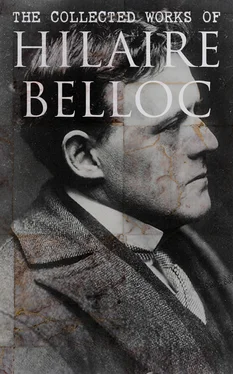Such considerations are, I repeat, the very foundation of military history; and throughout this Series they will be insisted upon as the light in which alone military history can be understood.
It is further true that not only may a campaign be successful in the military sense, and yet in the largest historical sense be a failure, but, quite evidently, the actions in a campaign may each be successful and yet the campaign a failure; or each action may, on the whole, fail, and yet that campaign be a success. As the old formulæ go, “You can win every battle and lose your campaign.” And, again, “A great general does not aim at winning battles, but at winning his campaign.” An action results from the contact of the opposing forces, and from the necessity in which they find themselves, after such contact, of attempting the one to disorganise or to capture the other. And in the greater part actions are only “accepted,” as the phrase goes, by either party, because each party regards the action as presenting opportunities for his own success.
A campaign can perfectly well be conceived in which an opponent, consciously inferior in the field, will avoid action throughout, and by such a plan can actually win the campaign in the end. Historical instances of this, though rare, exist. And there have even been campaigns where, after a great action disastrous to one side, that side has yet been able to keep up a broken resistance sufficiently lengthy and exhausting to baulk the conqueror of his political object in the end.
In a word, it is the business of the serious student in military history to reverse the popular and dramatic conception of war, to neglect the brilliance and local interest of a battle for the larger view of the whole operations; and, again, to remember that these operations are not an end in themselves, but are only designed to serve the political plan of the government which has commanded them.
* * * * *
Judged in this true light, we may establish the following conclusions with regard to the battle of Waterloo.
First, the battle of Waterloo was a decisive action, the result of which was a complete military success for the Allies in the campaign they had undertaken, and a complete military defeat for Napoleon, who had opposed them.
This complete military success of the Allies’ campaign was, again, equivalent to a success in their immediate political object, which was the overthrow of Napoleon’s personal power, the re-establishment of the Bourbons upon the French throne, and the restoration of those traditions and ideals of government which had been common to Europe before the outbreak of the French Revolution twenty-four years before.
Had the effect of this battle and that campaign been permanent, one could speak of their success as complete; but when we discuss that largest issue of all, to wit, whether the short campaign which Waterloo so decisively concluded really effected its object, considering that that object was the permanent destruction of the revolutionary effort and the permanent re-establishment of the old state of affairs in Europe, we are compelled to arrive at a very different conclusion: a conclusion which will vary with the varying judgment of men, and one which cannot be final, because the drama is not yet played out; but a conclusion which, in the eyes of all, singularly modifies the effect of the campaign of Waterloo.
It is obvious, at the first glance we take of European history during, say, the lifetime of a man who should have been a boy in Waterloo year, that the general political object of the revolutionary and Napoleonic armies was not reversed at Waterloo. It was ultimately established. The war had been successfully maintained during too long a period for the uprooting of the political conditions which the French had attempted to impose upon Europe. Again, those conditions were sufficiently sympathetic to the European mind at the time to develop generously, and to grow in spite of all attempted restriction. And we discover, as a fact, democratic institutions, democratic machinery at least, spreading rapidly again after their defeat at Waterloo, and partially victorious, first in France and later elsewhere, within a very few years of that action.
The same is true of certain secondary results of the prolonged revolutionary and Napoleonic campaigns. Nationality predominated over the old idea of a monarch governing his various “peoples,” and the whole history of the nineteenth century was a gradual vindication of the principle of nationality. A similar fate awaited institutions bound up with the French revolutionary effort: a wide and continually expressed suffrage, the arming of whole nations in defence of their independence, the ordering of political life upon the new plan, down even to the details of the revolutionary weights and measures (the metre, the gramme, etc.)—these succeeded and in effect triumphed over the arrangements which that older society had fought to restore.
On the other hand, the advance of all this was much slower, much more disturbed, much less complete, than it would have been had Napoleon not failed in Russia, suffered his decisive defeat at Leipzig, and fallen for ever upon that famous field of Waterloo; and one particular characteristic, namely, the imposition of all these things upon Europe by the will of a government at Paris, wholly disappeared.
We may sum up, then, and say that the political effect of the battle of Waterloo and its campaign was an immediate success for the Allies: that their ultimate success the history of the nineteenth century has reversed; but that the victory of Waterloo modified, retarded, and perhaps distorted in a permanent fashion the establishment of those conceptions of society and government which the Revolution, and Napoleon as its soldier, had set out to establish.
* * * * *
There is a side question attached to all this, with which I shall conclude, because it forms the best introduction to what is to follow: that question is—“Would Napoleon have ultimately succeeded even if he had triumphed instead of fallen upon the 18th of June 1815?” In other words, was Waterloo one of these battles the winning or losing of which by either side, meant a corresponding decisive result to that side? Had Wellington’s command broken at Waterloo before the arrival of Blucher, would Napoleon’s consequent victory have meant as much to him as his defeat actually meant to the allies?
The answer of history to this question is, No. Even had Napoleon won on that day he would have lost in the long run.
The date to which we must affix the reverse of Napoleon’s effort is not the 18th of June 1815, but the 19th of October 1812, when the Grand Army began its retreat from Moscow; and the political decision, his failure in which was the origin of his fall, was not the decision taken in June 1815 to advance against the Allies in Belgium, but the decision taken in May 1812 to advance into the vast spaces of Russia. The decisive action which the largest view of history will record in centuries to come as the defeat which ruined Napoleon took place, not south of Brussels, but near the town of Leipzig, two years before. From the last moment of that three days’ battle (again the 19th of October, precisely a twelvemonth after the retreat from Moscow had begun), Napoleon and the French armies are continually falling back. Upon the 4th of April in the following year Napoleon abdicated; and exactly a month later, on the 4th of May, he was imprisoned, under the show of local sovereignty, in the island of Elba.
It was upon the 1st of March 1815 that, having escaped from that island, he landed upon the southern coast of France. There followed the doomed attempt to save somewhat of the Revolution and the Napoleonic scheme, which is known to history as the “hundred days.” Even that attempt would have been impossible had not the greater part of the commanders of units in the French army, that is, of the colonels of regiments, abandoned the Bourbon government, which had been restored at Paris, and decided to support Napoleon.
Читать дальше












